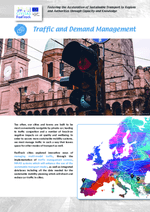
Image from Unsplash by Angela Compagnone
Braga (Portugal)
Braga is a city of 181,000 inhabitants, located in the Braga district of Portugal 46 km northeast of Oporto. Originally named Bracara Augusta, it was founded by Emperor Augustus, most likely in the year 16 B.C. The city that is proud of its history, aims to preserve its architecture, among others car access was limited.
It is the oldest city on the Iberian Peninsula and today the third city of Portugal. Braga is famous for its natural beauty, monuments and rich folklore.
No specific data is available on the city’s modal split. However, Braga has a small, but lively and attractive old center with many pedestrian streets and walkways crisscrossing its hilly terrain. The center is best explored on foot. The main thoroughfares are broad avenues that help disperse traffic in different directions.
Mobility challenges were addressed some years ago in an approach based on a few fundamental pillars: strategically located parking areas; limited car access to the city center and an urban transport company.
The city has a well-established public bus company: Transportes Urbanos de Braga (TUB). Its fleet consists of 120 vehicles and over the years there has been an effort to renew them with the aim of improving service and reducing environmental pollution. Two major seaports are within 50 km of the city: the Port of Viana do Castelo and the Port of Leixões. A cable car connects the city to one of the most important local tourist destinations, the sanctuary of Bom Jesus do Monte.
Braga has good rail connections to several cities in Portugal and is also served by the Alfa pendular high-speed train.
The city has a long-standing partnership with the urban transportation company for mobility policy making and operations. For the development of sustainable solutions, there is a good and very close collaboration with the Minho University. Braga has been associated with the first global network of electric cars (MOBI.E - a joint government-municipality programme) with the aim of installing infrastructure to support the use of electric cars. Finally, the city and three neighboring municipalities (Guimarães, Barcelos and Famalicão) developed a joint programme on mobility policies.













